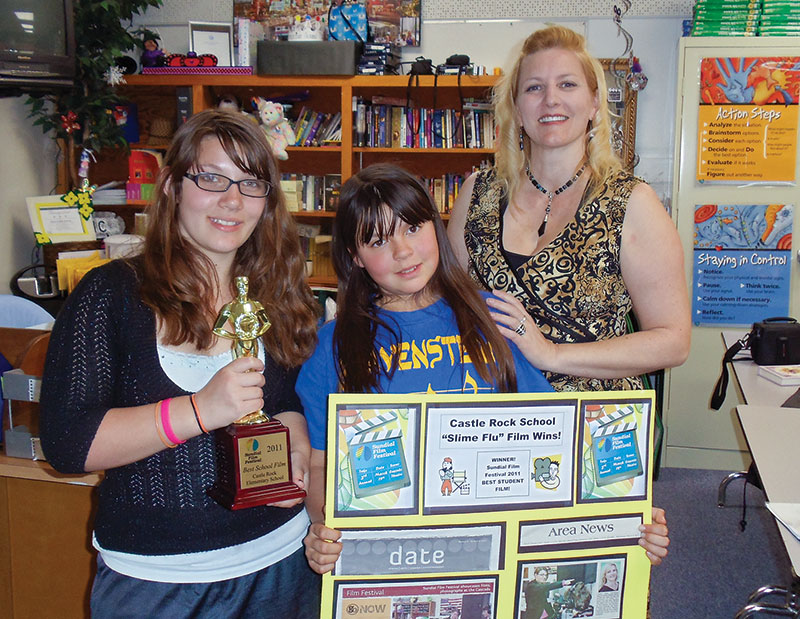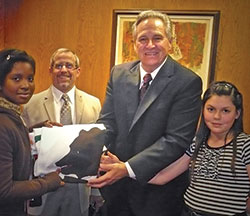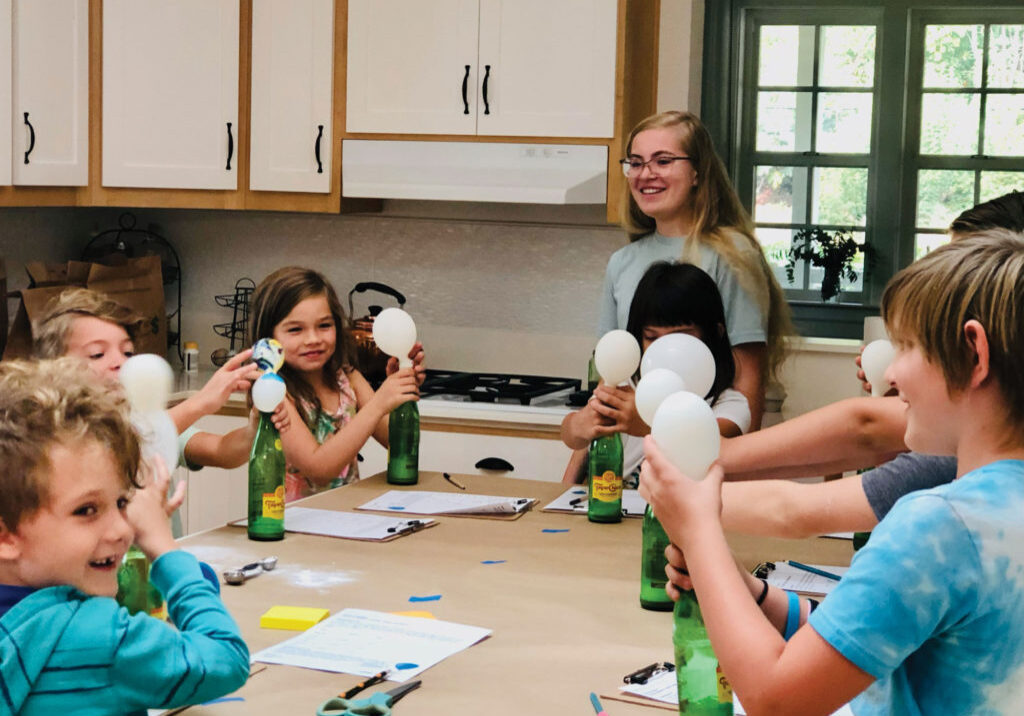
Ms. Moore and junior high students proudly display their Sundial Film Festival award.
Located 47 miles north of Redding, Castle Rock Elementary is a small rural school nestled in the mountain community of Castella. Established in 1887, its tranquil setting and family-like atmosphere conjures up a vision of an isolated one-room school house. But for the approximately 80 kindergarten through eighth grade students at Castle Rock, learning isn’t confined to the four walls of a classroom. Their proactive engagement in learning has connected them to their community at a local, state and national level.
As budget cuts threaten school programs statewide, small schools face an uncertain future. However, budget cuts haven’t hampered the education of Castle Rock Elementary students. In fact, they may have accelerated it. When a recent Legislative Analyst’s Office (LAO) report made the recommendation that schools with less than 100 students be merged with larger districts to save money, the students took the news seriously and got involved.
The sixth through eighth grade students, as part of a year-long process, wrote letters voicing their concerns about policies that may affect their school. This captured the attention of Assemblyman Jim Nielsen, who visited Castle Rock Elementary the year prior, and prompted his invitation to the students to tour the state Capitol and meet with him personally.
“They posed some tough questions, even one that caught Nielsen by surprise, not by the content, but by the students’ direct approach,” said Mark Telles, Superintendent/Principal of Castle Rock Elementary.

Assemblyman Nielsen presents the California flag to Castle Rock Elementary students and Superintendent/Principal Mark Telles.
The students asked Nielsen if he supported the LAO plan and if he would vote for legislation to force school consolidation if it came to the floor for a vote. According to Telles, Nielsen responded that he supports local control and does not believe shutting down small schools is in the best interest of the local community, but if a bill that would negatively affect small schools were attached to a budget bill that he really needed to pass, he would have to vote accordingly. “This isn’t something the students wanted to hear,” said Telles, “but they just learned a very real lesson about politics.”
“From that experience,” says Telles, “we have a relationship with Nielsen. He keeps us in the loop with bills that affect us, and for the kids, it’s a big deal. They speak directly to those in power and know that what they did affected his office. The students experienced real democracy. This is the way it’s supposed to be.”
“‘We have been seen and now we want to be heard!’ That’s the slogan the students repeated on the way to Sacramento,” says parent Kirstie Koschnick, who attended the field trip with her sixth-grade daughter. “They were so excited and proud to be making a difference.”
This isn’t the first time Castle Rock students have exercised their voice in the community. Under the direction of junior high teacher Stacie Luann Moore, the students’ film productions earned the 2011 Sundial Film Festival’s “Best Student Film of the Year” and the Whole Earth and Watershed Festival’s “Best Junior High Film” and “People’s Choice” awards. “This gave them a taste of things to come,” says Moore.
As the students head back to school this fall, they already have a project waiting for them. They will complete a documentary film with the working title Hear Our Voice! to convey their real-life experience with democracy. “This one is going national,” says Moore.
“Everyone works so hard together to keep the school running. Technology gives power to have a voice. It’s also a means to earn money to benefit the school and learn. The technology class alone earned almost $2,000 to help fund art and technology programs and pay for field trips like the one to Sacramento,” says Moore.
“As an educator I don’t think there is anything more rewarding or inspiring than to open the door to a new world of knowledge for your students and then to see them take ownership of that information and put it into action,” says Telles.
Though Castle Rock is a tiny rural school, the expectations are high and students take Mr. Telles’ advice to heart: Think BIG and see what you can do.
Posted in: Education
Comment Policy: All viewpoints are welcome, but comments should remain relevant. Personal attacks, profanity, and aggressive behavior are not allowed. No spam, advertising, or promoting of products/services. Please, only use your real name and limit the amount of links submitted in your comment.
You Might Also Like...

How Education Has Changed Now That Students Can “Google” the Answer
I love research and am so happy that instead of looking through paper index cards and bookshelves and climbing library stairs, students can find answers to much of their research […]

Two Schools In The North State Provide Students Unique Educational Opportunities
These days, parents have multiple options for choosing the best educational path for their children. In the past, choices for educating children were primarily public or religious schools. Alternatives now […]

Start Strong: Fun Ways to Celebrate Teachers at the Beginning of the Year
When was the last time you thanked a teacher? So often we go about life, grateful for their hard work, but we never really stop to thank them for the […]

Kid Collections: A Great Way to Boost Science Processing Skills
Have you noticed that any time you’re outside with children they naturally begin to pick things up and “collect” them? It’s part of their natural curiosity about the world and […]



